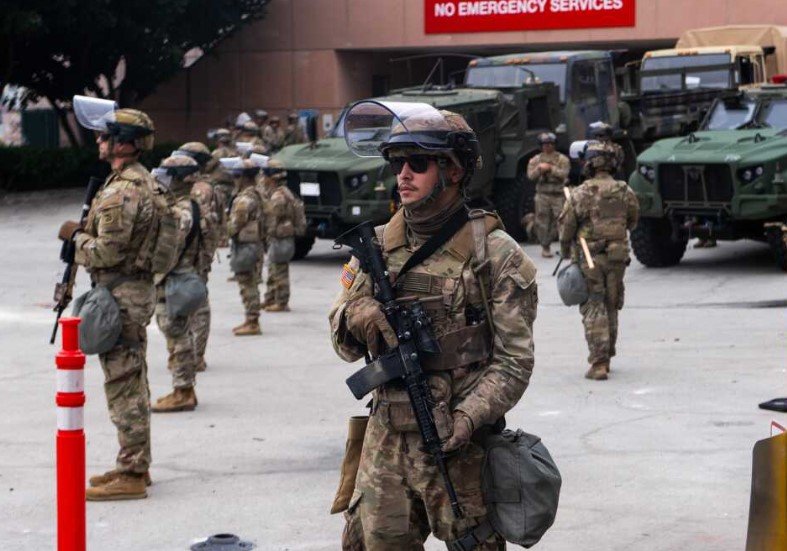U.S. President Donald Trump is preparing to send hundreds of National Guard troops to Washington, D.C., in a move he says will address homelessness and crime in the capital. The announcement, shared partly through his Truth Social account and confirmed by a senior administration official, has sparked fierce debate in the city — and revived memories of past military deployments in America’s political heart.
While the official stressed no final order has been given, the plan could see uniformed Guard members on D.C. streets within days. The stated aim: to “restore order” by relocating homeless residents and increasing visible law enforcement.
A Presidential Power Unique to D.C.
Unlike in U.S. states, where governors control National Guard activation, the president has direct authority over the D.C. Guard. That means Trump could bypass local opposition from Mayor Muriel Bowser, who has already questioned the need for federal intervention, pointing to official data showing no recent spike in violent crime.
The last large-scale Guard presence in Washington came after the January 6, 2021, attack on the U.S. Capitol — an event still politically charged and tied closely to Trump’s legacy.
This time, the administration insists the mission would focus on “public safety and sanitation,” although no operational details have been shared.

Trump’s Message: Tough Words, Vague Plans
On Truth Social, Trump was characteristically blunt: “The Homeless have to move out, IMMEDIATELY. We will give you places to stay, but FAR from the Capital. The Criminals, you don’t have to move out. We’re going to put you in jail where you belong.”
It’s language that echoes his earlier crackdowns in Los Angeles, where Guard troops were deployed during immigration protests despite local pushback.
Still, questions remain:
-
Where exactly would homeless residents be relocated?
-
How would shelters or facilities “far from the Capital” be staffed and funded?
-
Would Guard troops act in a policing role or simply provide logistical support?
The White House has declined to comment on what legal framework would underpin the operation.
Mayor Bowser Pushes Back
Mayor Bowser, a Democrat and frequent critic of Trump, has signalled resistance to the idea. She has argued that D.C. already has tools to address public safety and that crime statistics don’t support the portrayal of a city in crisis.
In July, D.C. police reported overall crime levels flat compared to last summer, though certain categories — like carjackings — remain elevated from pre-pandemic levels.
Homelessness in the capital has been more persistent. The 2025 annual point-in-time count recorded roughly 4,800 unhoused residents, with a noticeable rise in visible encampments around federal buildings.
Lessons From Past Guard Deployments
Deploying the Guard into urban areas is politically sensitive. In Washington, D.C., past mobilisations have included responses to civil unrest, natural disasters, and major protests.
| Year | Event | Approx. Guard Troops |
|---|---|---|
| 1968 | Riots after Martin Luther King Jr.’s death | 13,600 |
| 2020 | George Floyd protests | 5,000 |
| 2021 | Capitol riot aftermath | 25,000 |
Legal experts note that in 2020, the use of Guard forces for crowd control in Lafayette Square led to lawsuits and public backlash. Trump’s new plan could rekindle those legal fights if residents or advocacy groups view it as an overreach.
Advocates Sound Alarm
Homeless advocacy organisations warn that mass displacement without long-term housing solutions could worsen conditions.
Martha Jennings, director of the D.C. Shelter Network, said forcing people into remote facilities risks “breaking fragile connections to outreach services, jobs, and medical care.”
Civil liberties groups are also concerned about the optics of military personnel being used in domestic social policy enforcement. “It blurs the line between public safety and military authority,” said one constitutional lawyer.
Supporters See a Show of Force
On the other side, some business leaders and Republican lawmakers are backing Trump’s push. They argue that tourist-heavy areas around the National Mall and federal buildings have become less inviting, hurting the city’s economy.
“D.C. is the face of the nation. If visitors leave thinking it’s unsafe or dirty, that hurts everyone,” said Rep. Mark Caldwell (R-FL), a Trump ally.
They point to Guard deployments during natural disasters or large-scale events as proof the force can handle humanitarian and security roles simultaneously.
Political Stakes Are High
With the 2026 midterms looming and Trump’s reelection bid still in play, the optics of taking control in the capital could appeal to his base. It also sets up a likely clash with Democratic city leaders, a dynamic Trump has often used to rally supporters.
But the political risk is real. If images emerge of Guard troops forcibly moving homeless residents or clashing with activists, it could energise opposition and raise legal challenges.
For now, the administration is moving quietly, finalising troop numbers and clarifying rules of engagement. Officials insist the mission would not militarise the city but rather “restore dignity and safety” to public spaces.
Whether residents — and the rest of the country — agree with that framing is another question entirely.
